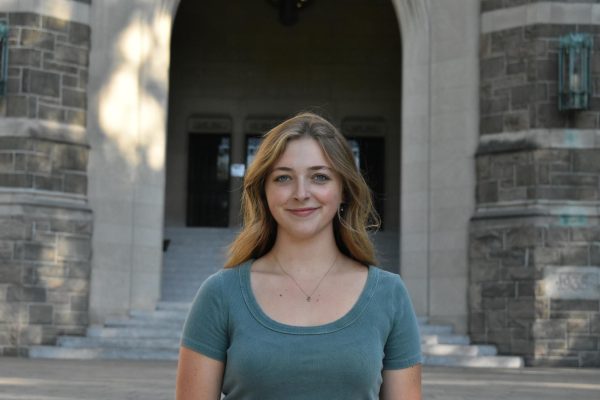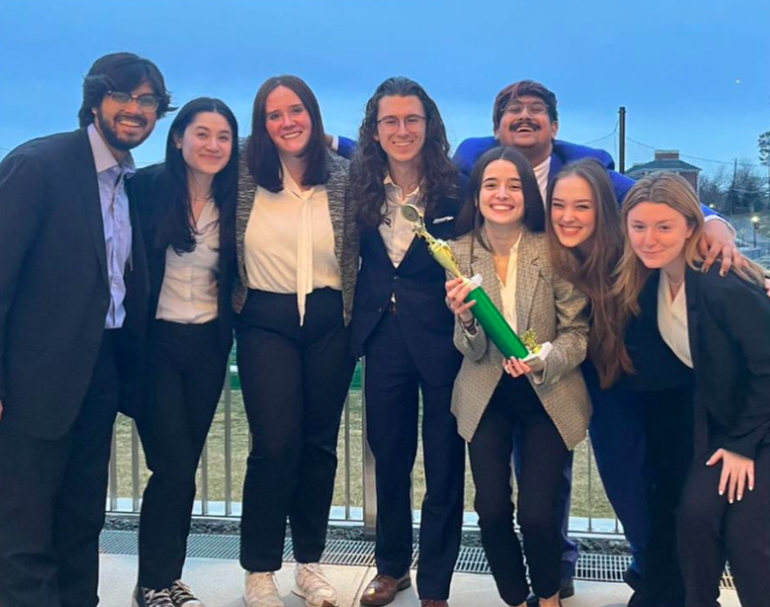Fordham’s Mock Trial Team Wins Second at the ORCs
On March 12, Rose Hill’s mock trial team, “Mocky Horror Picture Show,” won a second-place bid at New Rochelle’s Opening Round Championships (ORC), enabling them to compete in the final round of the American Mock Trial Association’s national competition. While 600 teams spend the year competing at invitationals and in regional competitions, only a minority of those teams win a bid to the ORCs. Only 48 of those teams manage to move on to nationals. Both of Fordham’s Rose Hill teams won awards at Princeton University Regionals, which took place in February, and competed at this year’s ORCs, but only “Mocky Horror Picture Show” won a bid to nationals. This is the first time any mock trial team from Rose Hill has made it to nationals since 2007.
The mock trial season begins in the fall, when the American Mock Trial Association (AMTA) sends out the year’s case packet. This includes about 200 pages of witness statements, case law and other information that will help mock trial teams all across the country develop their legal cases. Each team has to prepare to argue on the plaintiff side, as well as on the defense. When tournaments begin in the fall, the various teams practice arguing both sides against one another. As Emily Hiles, FCRH ’23, one of the members of “Mocky Horror Picture Show,” explained, “The cases are purposely written so that there are multiple ways that the plaintiff side and the defense side can go about it. So everyone is arguing from the same case material, but the presentations and theories that you get from it alternate really aggressively.”
During tournaments, “everyone runs the plaintiff side once and defense side once. Then, you do it again for day two, [so you compete] against four different schools. Effort wise, it’s a lot,” Hiles ultimately revealed.
Although they jokingly describe their time in mock trial as “lawyer LARP’in,” the members of both teams invest huge amounts of time and energy into their positions. During a normal week, when they are not prepping for a tournament, they meet for four hours a week. When they are prepping, they spend about 10 hours going over their arguments, witness statements and various other materials that they have to prepare. Even though the case remains the same throughout the entire year, the arguments they face in competition can (and do) change, forcing them to continuously hone and strengthen their arguments.
“The easiest part of it is the stuff that you can script… The difficult part is that you’re responding in real time to what’s happening there, and that’s a lot of thinking on your feet. That’s kind of make or break. There’s also a lot of having to adjust to defend against or combat with what the other team’s saying, or respond to theories that you don’t see coming,” said Hiles. “Because they can get pretty out there in the moment.”
When asked about the craziest theory that Hiles has come across during this year, she sighed in exasperation. The case itself has to do with negligence, an accusation levied against a fictional company who runs a flight school and one of their planes crashed. Hiles said:
“We went up against a team that the defendant, who owned the company, their parents secretly had a conspiracy — and were in on it with the police — to purposely crash the plane to get her to join their family company. So, it was absolutely insane and you don’t expect that going in. You have to figure out [your response] while you’re sitting there, and you obviously can’t talk because you’re in a courtroom setting.”
However difficult, the challenge of thinking on your feet has only deepened Hiles’ love for mock trial. She began her freshman year, sure that she wouldn’t make the team, hoping to get some practice at being rejected. A surprise to her, she made the team and competed in the A-Team her freshman year as a witness. While she now competes as an attorney, it took her a long time to gain the confidence that she now has.
“It took me two years of people instructing me on what to do, giving me tips to feel confident, but now that I’m confident that I kind of know what I’m doing, it’s a really good experience to know I’m passing that down to the next generation,” said Hiles.
Her passion for leading and inspiring her teammates is evident in her favorite memory of this season, which took place during the regional competition when both teams won a bid to ORCs: “Regionals had to be my favorite because it’s very difficult to even make it to the opening round of championships to qualify for nationals… It wouldn’t feel the same getting to move on if the other half of the program was disappointed in the process. We’re really proud of everybody and all the hard work they got to put in.”
The most important aspect of mock trial is, of course, the fantastic puns that they use to name their teams. This year alone saw the names “Mocka Flocka,” “Fleetwood Mock” and “Egged or Mocked,” their satiric range including references to ’70s rock-n-roll and Fordham legends. While their first team’s name is “Mocky Horror Picture Show,” the second team’s name was “Mocked and Loaded.” Their punny names are a staple of the Fordham team’s culture. At the beginning of the year, when they assign teams, they spend about 30 minutes brainstorming various clever mock trial-related puns. After intense debate, they select their names. Hiles laughed, saying, “It’s a fight every year, but I always think they’re entertaining.” For anyone interested, Mock Trial holds try-outs in early September every year. Visit their Instagram (@fordhamrhmock) to find out more details and information.

Kari White is a senior from the blink-and-you’ll-miss-it state of Delaware. She is majoring in English with a concentration in creative writing, as well...











































































































































































































